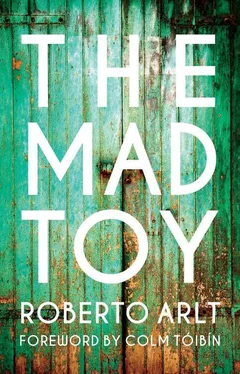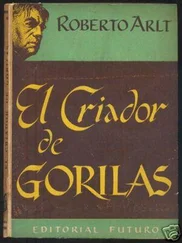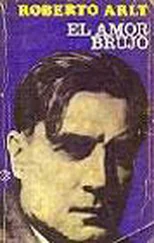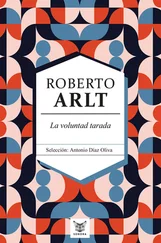The woman turned her aggressive gaze back to the street.
‘Okay,’ Don Gaetano continued, ‘come to my house at ten tomorrow; we live in Esmerelda Street.’ And he wrote the address down on a piece of paper and gave it to me.
The woman didn’t respond to my farewell. Motionless, with her cheek on the palm of her hand and her naked arm pressing down on the spines of some books, with her eyes staring at the front of Dardo Rocha’s house, she seemed the dark genius of the book-cave.
At nine o’clock in the morning I stopped outside the house where the bookseller lived. After I had rung the bell, to hide from the rain I hid myself in the porch.
An old man with a beard, with his neck smothered in a green scarf and his cap hanging down to his ears, came out to meet me.
‘What do you want?’
‘I’m the new employee.’
‘Come up.’
I climbed the stairwell with its dirty uppers.
When we got to the corridor, the man said:
‘Please wait.’
Through the glass panes of the street window that looked out onto the balcony, one could see the chocolate-coloured iron sign of a shop. The rain flowed slowly down its varnished convexities. In the distance, a chimney between two water tanks threw out great canvases of smoke into the space that was being stitched up by needles of rain.
The nervous sound of the tram bell was repeated regularly, and there were violet sparks jumping between the trolley and the shuddering cables; the croaking crow of a rooster came from I don’t know where.
A sudden sadness overcame me as I faced the house and its neglect.
The glass in the doors was unshaded, the shutters were closed.
In a corner of the hall, on the dusty floor, someone had abandoned a crust of dry bread, and in the air there hung the smell of sour paste: the stink of long-wet dirt.
‘Miguel,’ the woman’s disagreeable voice came from inside.
‘Coming, señora.’
The old man lifted his arms into the air and with his fists clenched went to the kitchen that lay across a wet patio. I heard the voices of Don Gaetano and his wife.
‘Miguel.’
‘Señora.’
‘Where are the shirts that Eusebia brought?’
‘In the small trunk, señora.’
‘Don Miguel,’ the man said sarcastically.
‘Yes, Don Gaetano.’
‘How are things with you, Don Gaetano?’
The old man moved his head from side to side, raising his disconsolate eyes to the heavens.
He was thin, tall, with a long face and a three-day beard on his flaccid cheeks and the sad expression of an abandoned dog in his unfocused eyes.
‘Don Miguel.’
‘Yes, Don Gaetano.’
‘Go and buy me an Avanti.’
The old man set off.
‘Miguel.’
‘Señora.’
‘Bring a half kilo of sugar cubes, and make sure they weigh them right.’
A door opened, and Don Gaetano came out, holding his trousers up with both hands and with a broken-off piece of comb suspended in his curly hair over his forehead.
‘What’s the time?’
‘I don’t know.’
He looked out at the patio.
‘Bloody weather,’ he muttered, and started to comb his hair.
When Don Miguel came back with the sugar and the cigars, Don Gaetano said:
‘Bring me the basket, then you take the coffee to the shop,’ and, putting on a greasy felt hat, he took the basket the old man brought him and then passed it on to me, saying:
‘Let’s go to the market.’
‘The market?’
He picked up on what I said.
‘A piece of advice, che Silvio. I don’t like saying things twice. Anyway, buying in the market you know what you eat.’
I came sadly after him with the basket, a ridiculously large basket, which chittered as it banged against my knees and made the disgrace of being poor all the deeper, all the more grotesque.
‘Is the market far away?’
‘No, kid, here in Carlos Pellegrini,’ and then seeing me down in the mouth he said:
‘It’s like you were ashamed to carry the basket. An honest man shouldn’t be ashamed of nothing, as long as it’s work.’
A dandy whom I nudged with the basket gave me a furious glare, a rubicund porter who had been wearing his uniform with its magnificent livery and gold trim all morning looked at me ironically, and a little urchin who was passing by, as if by accident, gave the bottom of the basket a kick, and the radish-red basket, ridiculously large, made me the focus of all the world’s ridicule.
‘Oh the irony! I, who had dreamed of being a bandit as great as Rocambole, and a poet with the genius of Baudelaire!’
I was thinking:
‘Do you need to suffer this much to live…? All of this… to walk with a basket in front of splendid shopfronts…’
We spent almost the entire morning walking through the Mercado del Plata.
Truly, Don Gaetano was a great man!
To buy a cabbage, or a slice of pumpkin or a handful of lettuce, he would go through all the stalls arguing, having intense and bitter arguments with the grocers over five centavos, trading insults in a dialect I did not understand.
What a man! He behaved like a cunning peasant, a con-artist who pretends to be dumb and who makes a joke of it when he realises that he can’t cheat someone.
As he sniffed out bargains he would mingle with the cleaners and the servants to get involved in things that should have held no interest for him, he behaved like a mountebank, a barker, and when he got close to the tin counters of the fish stalls he would examine the gills on the hake and the pejerreys,17 he would eat prawns, and all this without even buying a single shrimp, he’d go on to the tripe sellers, then the chicken sellers, and before buying anything he would smell the merchandise and smell it mistrustfully. If the stallholders got annoyed, he’d shout at them that he didn’t want to be cheated, that he knew very well that they were thieves, but that they were much mistaken if they thought that he was a fool just because he was such a simple person.
His simplicity was an act, his stupidity hid a really active cunning.
This is how it went:
He would choose a cabbage or a cauliflower with a truly exasperating patience. He would be ready to pay the price that was asked him, but suddenly would discover another one that looked larger or tastier, and this was enough for an argument to brew between Don Gaetano and the stallholder, each of them trying to rob the other, to cheat their fellow man, even if it was only of as much as a single centavo.
His bad faith was astonishing. He never paid what was asked, only what he offered. Once I had put the produce into the basket, Don Gaetano would step away from the stall, sink his thumbs into the pockets of his jacket, take out the money, count it, count it and recount it, and then throw it down onto the counter as if he were doing the stallholder a favour, and then move quickly away.
If the owner shouted after him, he would reply:
‘ Estate buono. ’18
He had the urge to keep moving, he was a glutton for looking at things, he went into ecstasies when he saw all the produce because of the money it represented.
He would go up to the pork sellers and ask them the price of their sausages, he would look carefully at the rosy pig-heads, turn them over in his hands slowly under the bland gaze of the bulky owners in their white aprons, scratch his ear, look with lust at the ribs hanging from their hooks, the pillars of sliced fatty bacon, and then, as if he were resolving a problem that had been tormenting his mind, would head off to another stall to snaffle a slice of cheese or count how many asparagus there were in a bunch, to get his hands dirty with artichokes and turnips, to eat pumpkin seeds or hold eggs up to the light and rejoice in the heaps of wet butter, solid, yellow, still smelling of whey.
Читать дальше












